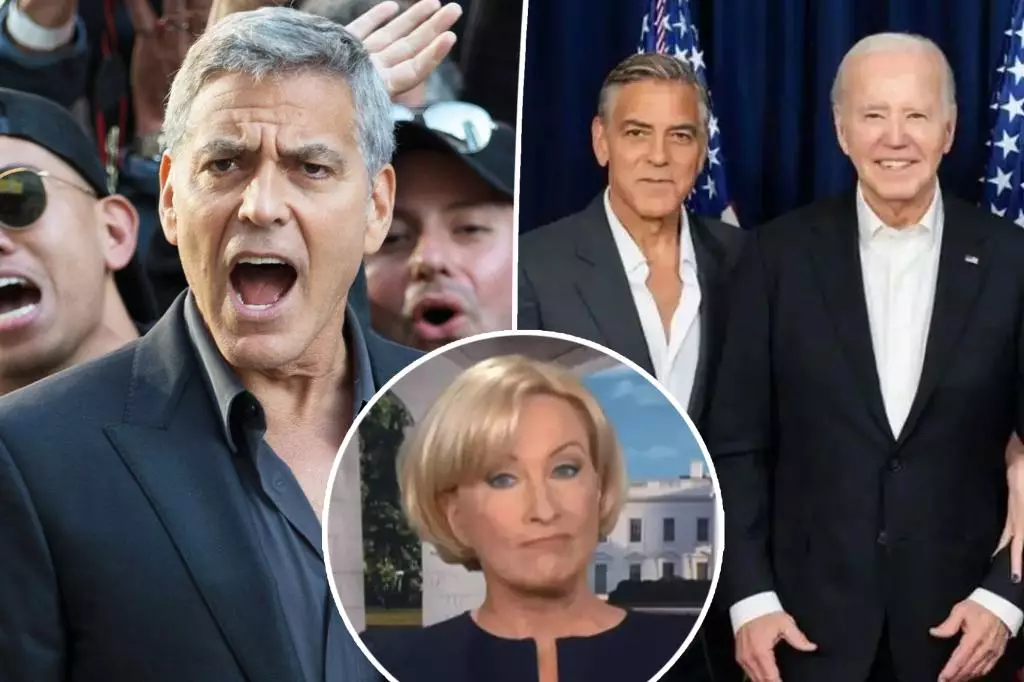In the often chaotic realm of political commentary, few incidents illuminate the intersection of celebrity influence and media narratives like the recent uproar involving George Clooney and the MSNBC show “Morning Joe.” This confrontation, as highlighted in Chris Whipple’s insightful exposé, “Uncharted,” sheds light not only on the relationships between Hollywood and political elites but also on the consequences of public statements in today’s media-driven society. At its core, this incident illustrates how the binding thread of friendship and professional loyalty can fray in the most public of arenas.
The Catalyst: An Unexpected Allegation
The genesis of Clooney’s outrage appears to stem from co-host Mika Brzezinski’s insinuation that former President Barack Obama orchestrated the actor’s op-ed in The New York Times, which called for President Joe Biden to consider stepping back from the 2024 presidential race. “This wasn’t George Clooney…I think that Barack Obama has a lot of influence,” Brzezinski commented, igniting a firestorm that Clooney could not ignore. To suggest that a Hollywood figure of Clooney’s stature might play the puppet in a political theater directed by Obama is not just incendiary; it is a reductive statement that undermines the autonomy of an individual whose work and opinions extend well beyond mere celebrity status.
An Outrageous Response
The following events escalated rather dramatically. According to Whipple, Clooney’s reaction was anything but muted. His call to a producer at MSNBC, reportedly a personal friend, quickly turned into a heated exchange marked by colorful language and unfiltered frustration. The depth of Clooney’s feelings illustrates the weight of public perception, especially when one finds themselves embroiled in a narrative they perceive as false or defamatory. When Clooney allegedly exclaimed, “You [f–ked] me. You’re my friend. You should have stood up for me,” it marked a pivotal moment in which the actor sought to reclaim his voice from a media narrative that had spun beyond his control.
The Make-or-Break of Media Relationships
Despite Clooney’s claims of betrayal, the producer’s retort—“George, it’s just not a movie, where you go script page to script page”—points to the complexities of media dynamics. The producer’s insistence that “nobody gives a [f–k]” about the uproar underscores a harsh reality: contentious opinions, especially those involving political figures, often have a life of their own in the public consciousness. The producer’s response not only hints at a recognition of the fleeting nature of media moments but also exemplifies the challenge of balancing personal connections with professional integrity in a high-pressure environment.
Hearing Clooney’s subsequent insistence that he didn’t fully trust his friend adds another layer to the drama. His vulnerability in the moment resonated with an audience that has seen public figures fall from grace or become embroiled in controversy. In many ways, this exchange transcended the initial issue—it touched on an intimate portrayal of trust and betrayal, primal emotions that reach beyond the glitz of Hollywood.
The Fallout of Celebrity Involvement
This incident also stimulates a broader conversation about the role celebrities play in our political discourse. When figures like Clooney declare their opinions on political matters, they invite scrutiny that is often disproportionate to their actual influence. The fringes of public opinion can amplify narratives, propelling celebrities into unwanted positions of being the metaphorical scapegoat for broader political discontent. Clooney’s experience is a cautionary tale—an insightful reminder that regardless of fame, the weight of political discourse can press heavily on those who dare to speak out.
The tension between Clooney and the MSNBC producer serves as a microcosm of today’s charged political environment and the often volatile implications of media statements. Clooney’s indignation raises essential questions about accountability, loyalty, and how narratives shape the perceptions of even the most notable personalities. As we navigate the turbulent waters of media, politics, and celebrity, it becomes imperative to engage with these discussions critically, understanding the layered implications of our interactions and communications in the public arena.

